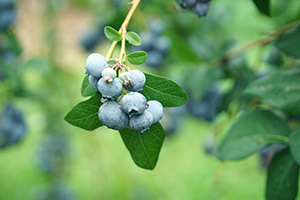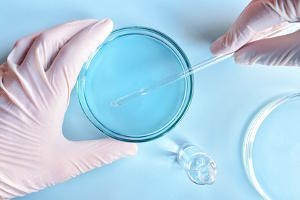31-01-2018
Cancer therapies: berries increase treatment efficacy
 Everyone knows someone who has had to undergo radiotherapy. For 200,000 cancer victims each year, it becomes part of their daily life, with varying degrees of success: it’s estimated that around 40% of cancers are cured by this form of treatment, whether used alone or in conjunction with other therapies.
Everyone knows someone who has had to undergo radiotherapy. For 200,000 cancer victims each year, it becomes part of their daily life, with varying degrees of success: it’s estimated that around 40% of cancers are cured by this form of treatment, whether used alone or in conjunction with other therapies.
It’s an onerous treatment inasmuch as it destroys not only cancer cells but neighbouring healthy cells too. There are, however, chemical compounds that can help improve its efficacy. Scientists from the University of Missouri have just identified precisely this type of molecule, known as radiosensitizers, in blueberries1.
What’s a radiosensitizer?
In exposing an area of the body to radiation, the aim is to inflict sufficient damage to induce the death of cancer cells. Most of the time, this death is initiated by the cell itself after too great an accumulation of damage. To destroy cells by necrosis, in other words, by rupturing the cell membrane or by breaking down organelles, the body would have to be exposed to doses of radiation that are far too dangerous for it to withstand. Thus the only option is to hopefully cause enough damage to DNA that the cell triggers its own death.
The problem is that some cancer cells remain largely unaffected by ionising radiation, such as is the case with liver tumours or those in poorly-oxygenated regions of the body. In the absence of oxygen, cancer cells suffer less DNA damage than others because they are less exposed to reactive oxygen species (the famous ‘free radicals’). What also happens is that cancer cells become better at repairing radiation-induced damage; tumours are said to acquire a tolerance to radiotherapy2.
It then becomes necessary to raise the intensity of the radiation to levels closer to the maximum dose tolerable in order to trigger irreparable damage, which necessarily involves harming neighbouring healthy tissue. Chemical compounds called radiosensitizers are therefore used to improve the radiation’s efficacy. In the majority of cases, these compounds prevent the cells from repairing radiation-induced damage by disrupting one or more repair mechanisms34. Whichever is the case, they have the effect of boosting the radiotherapy’s efficacy.
Blueberries induce apoptosis in cancer cells
Scientists conducting laboratory tests on a mass of cancer cells exposed to ionising radiation observed a 20% reduction in cell numbers. However, when such exposure was accompanied by the application of a blueberry extract on the tumour, cancer cell numbers decreased by 70%. The researchers were subsequently able to identify the molecular mechanisms responsible for this effect: it seems the resveratrol and flavonoid content of the blueberries (and berries in general) reduces the proliferation mechanism in cancer cells and encourages apoptosis (programmed cell death)5-7. In other words, it’s almost as if the compounds in blueberries convince the cancer cells to self-destruct by lowering the damage threshold required to activate the process.
Until now, berries were recognised for their ability to improve the condition of cancer patients, whatever the stage of the disease, with the fruits’ virtues attributed to a high content in antioxidants. It now seems we need to include their likely radiosensitizer properties which are responsible for their efficacy-enhancing effects, particularly in the case of radiotherapy. Those wishing to benefit from the significant boost offered by berries can choose between eating the fresh fruits themselves or supplementing with concentrated products such as Wild Maqui Berry or Optiberry, which contains extracts of blueberry as well as cranberry and elderberry.
References
1. Kristoffer T. Davidson, Ziwen Zhu, Qian Bai, Huaping Xiao, Mark R. Wakefield, Yujiang Fang. Blueberry as a Potential Radiosensitizer for Treating Cervical Cancer. Pathology & Oncology Research, 2017; DOI: 10.1007/s12253-017-0319-y
2. Gewirtz DA et al. Promotion of autophagy as a mechanism of radiation sensitization of breast tumor cells. Radiother Oncol 62 :323-328, 2009.
3. Seiwert TY, Salama JK and Vokes EE, The concurrent chemoradiation paradigm-general principles. Nat Clin Pract Oncol 4 :86-100, 2007.
4. Pawlik TM and Keyomarsi K, Role of cell cycle in mediating sensitivity to radiotherapy. Int J Radiat Oncol Biol Phys 59 :928-942, 2004.
5. Yi W ; Fischer J Krewer G, Akoh CC (2005), Phenolic compounds from blueberries can inhibit colon cancer cell proliferation and induce apoptosis, J Agric Food Chem 53(18) :7320-7329.
6. Wedge DE et al. 2001, Anticarcinogenic activity of strawberry, blueberry and raspberry extracts to breast and cervical cancer cells. J Med Food 4(1) :49-51.
7. Routray W, Orsat V (2011), Blueberries and their anthocynanins factors affecting biosynthesis and properties. Compr Rev Food Sci Food Saf 10(6):303-320.
Order the nutrients mentioned in this article
 Resveratrol
ResveratrolThe most effective and best-researched phytonutrient for maintaining and protecting health
www.supersmart.comFurther reading
10-06-2014
Cruciferous vegetables - broccoli, cabbage, cauliflower - all contain powerful phytonutrients capable of modifying oestrogen metabolism in both women and men, thus preventing certain hormone-dependent...
Read more03-11-2016
Studies on mice have shown that activating certain genes may prolong their life expectancy by 45%. The genes thought to be responsible for this extension...
Read more08-03-2011
A Swedish study examined the diets of 525 men under the age of 80 with a diagnosis of prostate cancer made between January 1989 and...
Read more© 1997-2024 Fondation pour le Libre Choix
All rights reserved
All rights reserved
Free
Thank you for visiting our site. Before you go
REGISTER WITHClub SuperSmart
And take advantage
of exclusive benefits:
of exclusive benefits:
- Free: our weekly science-based newsletter "Nutranews"
- Special offers for club members only


















